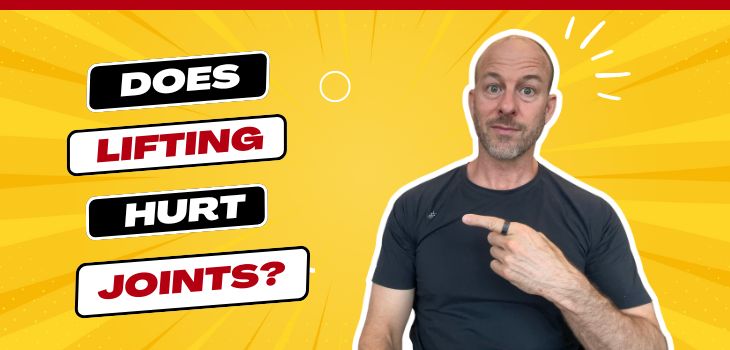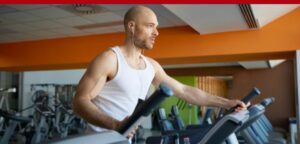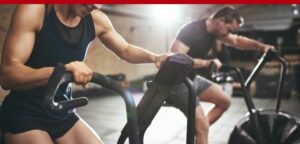by Ted Ryce
Ted Talk 225: Does Weight Lifting After 40 Harm Your Joints? - Ask Ted
by Ted Ryce
by Ted Ryce
Ted Talk 225: Does Weight Lifting After 40 Harm Your Joints? - Ask Ted
Ted Talk 225: Does Weight Lifting After 40 Harm Your Joints? - Ask Ted
more
by Ted Ryce
Ted Talk 225: Does Weight Lifting After 40 Harm Your Joints? - Ask Ted
On today’s Ask Ted episode, Ted addresses a common concern: does regular weight lifting harm your joints if you’re over 40? If you’re hitting the gym and worried about injury or existing joint issues, this episode is for you.
Ted will talk about the misconceptions around muscle and joint wear and tear. He is going to reveal the real culprits behind joint pain, what happens beyond the gym and how it affects joint health.
He debunks the myth that weightlifting leads to joint pain and emphasizes the benefits of weightlifting for strengthening muscles, tendons, and bones.
He also discusses the risks of a sedentary lifestyle and highlights the importance of resistance training for overall fitness and more. Listen now!
You’ll learn:
- The impact of weight lifting on people over 40
- The truth about weight lifting and joint health: debunking myths
- The real culprits behind joint pain
- Beyond the gym: holistic approaches to joint health
- Embracing fitness for longevity
- And much more…
Related Episodes:
577: Can Visceral Fat Affect Your Joint Pain? (And What To Do About It)
Ted Talk 158: “I Hurt Myself Working Out. What Should I Do?” – Ask Ted
Links Mentioned:
Learn More About The Unstoppable After 40 Coaching Program
Join The Unstoppable After 40 Newsletter
Schedule a Strategy Call with Ted
Watch the Body Breakthrough Masterclass
Connect with Ted on X and Instagram
Want some help building your best body ever?
Together, we’ll craft a personalized plan to reclaim your health and transform your body in a way that fits your busy lifestyle.
If you want to learn more about our Unstoppable After 40 Coaching Program, click here!
We have limited spots, so click here to book a call now!
Podcast Transcription: Ask Ted: Does Weight Lifting After 40 Harm Your Joints?
Ted Ryce: On today's Ask Ted episode, I'll be answering the question, if you're over age 40, does regular weight lifting harm your joints such as shoulders, knees, back, et cetera, in the long run? So if you're someone who's in the gym and you're wondering, am I putting myself at risk here for an injury? Or maybe you've even had some injuries and you're worried that what you're doing is causing long -term damage and you won't be able to keep it up.
This is the episode for you. So we're gonna be talking about the misconceptions of muscle and joint wear and tear. We're gonna talk about the real culprits behind joint pain. We're gonna talk about what happens beyond the gym and how it affects joint health.
So, if that's what you're interested in, you're in the right place. What is up my friend and welcome to the Legendary Life Podcast. I'm your host, Ted Ryce, health expert and coach to executives, entrepreneurs and other high performing professionals. Now we produce this show for two reasons. One, I want to bring you the best science -based information on fat loss and long -term health optimization on the internet.
And the second is if you're a high performer and you're looking to fast track your success with your health so that it matches what you've done in your career, you'll know who to hire. So let's dive into it. Now this question, it's a good one, but it's a bit misguided. So let's just tackle the first idea behind this. There's a widespread belief that as you age, weightlifting is more likely to leave you with creaky knees, aching backs, and shoulders that you can't sleep on.
And this notion, while grounded in genuine concern, it misses the forest for the trees. Because research has consistently shown that regular moderate weightlifting actually strengthens the muscles, tendons, and even the bones themselves. It's a classic case of use it or lose it. And when you're thinking about like, okay,
There are risks if you're in the gym and you're lifting and you're pushing yourself. And there are also risks if you don't exercise.
And what you need to ask yourself is this, what type of person do you want to be? I don't know if you had the same situation with your parents, but I'm 47. I watched my parents not take care of their health. I watched my dad in particular lose his ability to walk. By the end of his life, he was in a wheelchair. Now we're all going to die, but we choose how we live.
And you have to ask yourself, are you going to live in fear and suffer the consequences that we'll get into of a sedentary lifestyle, which we know is very high risk, by the way.
In fact, the things that correlate with longevity the most are leg strength and VO2 max. So VO2 max is a function of how fit your cardiovascular system is and your leg strength. It's the thing that allows you to even do cardiovascular fitness.
They're the two most important things and obviously upper body strength as measured with grip strength is important as well.
And this is serious stuff. Right? So, so I want you to think about this muscle. And this comes from Dr. Gabrielle Lyon. She says that muscle is the organ of longevity. And I think that's true in so many ways. It's a bit of a, what you call like a social media, like a tweet type of thing to say, because it's more nuanced than that. But I think it's a really helpful way of looking at it because one of the things that's killing us is our sedentary lifestyle.
It's not only killing us physically and physiologically, but it's also psychologically taking a big toll on us. In fact, I just looked at a study that showed a connection between the amount of hours people spent being sedentary.
There was a linear relationship, with depression and depressive symptoms. So you can tell, you can say there's a pretty strong connection showing that the more you sit on your butt, the unhappier you're going to be. Again, this is all about looking at the risks. Lifting weights, it's not without risks, even if you're pretty careful. And we're about to get into the real science, the real culprit, sorry, behind joint pain and. some of the things that go beyond what you do in the gym and how it affects your health.
But I want you to ask yourself this question, what type of person you're being. And again, no judgments here. We all have to decide who we want to be and how we want to live. But also, if you're unhappy with the consequences, don't complain.
And definitely don't complain on social media. Nobody wants to read that. So let's talk about the real culprits behind joint pain. If lifting weights isn't the villain of this story, then who or what is? And the answer lies in the nuances of how we lift weights, as well as what else we do and sometimes don't do. So when it comes to what we do in the gym, if you are...
If you are loading up the weights, in other words, you're adding weight and you're using poor, you're pushing yourself to the limit that's gonna put you at a higher risk of injury. If you don't do a warmup that raises your body temperature and get your body ready for harder exercise, you're putting yourself at a risk of injury. Again, that's what the research says.
So it's not so much the act of lifting weights that's at fault here, but the disregard for the principles of safe weight lifting. And no judgments here again, I've done plenty of stupid stuff. Unfortunately, I didn't have mentors when I was in my twenties. I started in the business at 22 and I got my information from magazines and from the internet, probably like you're getting your information, but the thing that I wish I could go back and do is work with mentors. I ended up making money and hiring mentors when I got into, um, when I got into the business and started becoming a successful personal trainer, but I would have hired them earlier.
And I also want to talk about the risks of a sedentary lifestyle, because what we know about the sedentary lifestyle already had mentioned depression and other things. But one of the things that happens with a sedentary lifestyle is that your chances of chronic inflammation go up and also metabolic dysfunction.
In fact, we focus so much on nutrition when it comes to diabetes and being pre -diabetic or diabetic, but a big part of diabetes, now there is some genetic factors here too, but it's like we're just not active enough. We're just not active enough.
So, the lack of physical activity we know leads to muscle atrophy. What happens when your muscles shrink? Well, you're going to be less metabolically healthy. You're also going to lose strength because there's no point in keeping strength and muscles if you're not using them. Your body is very conservative in that way. You can expect joint stiffness and a big part of that joint stiffness is going to come from two things.
Number one is the inflammation because you're being so sedentary. And number two is that joints and the structures inside them, so your tendons, ligaments, and cartilage, they don't have direct blood supply. They get their nutrition from movement.
And there's also a decrease in bone density. So this is setting the stage for injuries, even from mundane tasks. As you get weaker and less fit, you're actually, people don't realize this. I want you to pay attention. People say, well, you know, lifting weights is so dangerous. Well, what about carrying groceries? What about moving stuff in your house, moving some boxes putting it up in the attic or down in the basement.
What about moving some furniture around? If you don't take care of yourself or don't lift weights, and by the way, when I say lifting weights, it doesn't have to be with barbells or dumbbells. It could be with body weight exercise, could be with exercise balls or bands or kettlebells or club bells. And, you the tools don't matter, but are you doing resistance training because you want to be in shape for what you do in life.
What about running after your kids or picking them up if you have young kids? What about out flexing your teenage son if he's a stud and lifting weights and, you know, a bill anyway, for those fathers out there who've got studly teenage sons. And in contrast, weightlifting when done correctly, it's going to enhance your body's resilience.
It's going to make it more adapt at handling the rigors of daily life. I don't think people appreciate, I don't think you might appreciate how sedentary we are and how this modern world and hey, listen, I'm not a, what do you call it? A Luddite. I don't want to go back and hunt and gather. I like modern life or at least a lot of parts of it.
But at the same time, we have to realize, oh, this is really taking away from our health. We're not designed to be sitting on our butts for six plus hours a day staring at computer screens, which by the way, I'm sitting right now staring at a computer screen.
So again, no judgments. I'm struggling with the same things you're struggling with but we have to go out of our way to counteract the incredible abundance and leisure that modern life has afforded us. So let's talk a little bit about beyond the gym. What is a more holistic approach to joint health? Because addressing joint health, especially for men over 40, it requires more than just safe lifting.
Nutrition plays a pivotal role as we talked about inflammation, researchers have identified arthritis, and I'm not talking about rheumatoid here, I'm talking about osteoarthritis as an inflammatory condition. Well, what causes the inflammation? Well, one of the things is if you cause inflammation from that lifting that you've been doing, that's one thing. But another thing is, do you have a diet rich in omega -3 fatty acids? We know that affects inflammation levels.
What about antioxidants? What about adequate protein that supports muscle recovery and joint health and going beyond nutrition, what about sleep? One thing that we know is that sleep and stress management play a role in injuries. Research underscores the connection between adequate sleep, low stress levels, and improved physical recovery.
One thing that I should say right now is that stretching doesn't really play a big role in preventing injuries, no matter what has been passed down for the past few decades.
While stretching can be a part of a more dynamic warmup, it shouldn't be, well I stretch out and then I go lift.
Okay. I just want to throw that in there. That's a bit of a bonus that I think I should talk about. So I'll mention it there, but I want to talk more about the stress and the sleep because that's the thing people, even if you're a person, if you've wondered, well, I go into the gym and I push myself hard and I just don't seem to make that much progress. I'm not getting stronger. Could be your program. It might suck because frankly,
A lot of people think they're doing a good job because they've been in the gym for a long time, but that's not necessarily the case.
However, let's assume that you're on a great program, not the five by five or strong lifts or P90X or whatever, but you're on a well -designed program that's appropriate for you.
How are your stress levels? How are your sleep? Do you sleep less than seven hours? Well, that's gonna affect your recovery. And this is super important. Let's say you have a very stressful work. Let's say you run a business or have a very stressful, you know, you work in a company, it's very stressful. And let's say there's some stress at home too.
And then you go to the gym and what do you do? You push yourself hard. Well, here's the thing. Stress isn't separate, it's cumulative. So this is something that we know. It's more recent.
Let's say breakthrough or more recent understanding. It's not just show up, lift weights, get stronger and get fit. We know that sleep and stress play a role in physical recovery, as I stated earlier. So I want you to think about it. Are you waking up, you're pounding coffee, have a stressful day at work, putting out fires, putting out the dumpster fires as a lot of my clients call them.
And then you go to the gym and then you either do hit training or you do heavy weightlifting and you push yourself hard. Well, you're, you're driving up your stress with that.
And that's why one of the things I do with myself, because sometimes what I do is quite stressful. I may not sound like it because I'm always so happy to record a podcast, but I guarantee you some of the social media stuff that I do and some of the content creation that gets stressful. And some of the things that go wrong with some of the tech, it gets stressful. Sometimes I let it, you know, I, what do you call it? Let it roll off the shoulders, but sometimes it really freaking bothers me. I get irritated.
You just don't hear it when I'm recording an episode, but I guarantee that it happens. So these things play a role. And when that happens, what do I do? I take it a little easier.
So I'll give you a little bit of a bonus tip here. One of the things that you can do when you're having more stress and you're feeling like, oh, I should really go to the gym today. The better thing to do would be to skip the harder workout and do something a little bit easier. That could be just doing one set. That could be doing aerobic exercise instead of lifting weights. I've had many clients who told me in the past, you know what?
I was going to work out today, Ted, but I just couldn't do it. I was so stressed from today. I said, Hey, no problem. I want to give you the permission to skip your weights, but not your workout. Go hit your aerobic exercise. In fact, aerobic exercise can make you come back stronger the next day. Low intensity aerobic exercise, mind you, not doing HIIT training, but low intensity aerobic exercise can help you come back the next day and be stronger.
So keep all those things in mind. So let's wrap up here. So to the men over 40 pondering whether to lift or not to lift, the evidence leans heavily in favor of embracing the iron, whether it's iron or elastic.
With proper technique, a balanced approach to fitness, and a mindful eye on recovery and nutrition, weight lifting, it's going to be your most arguably your most important ally in maintaining your strength, vitality and joint health well into your golden years. And remember, the goal is not to lift the heaviest weights, but to lift intelligently, ensuring that you can enjoy an active injury free lifestyle.
And as Jack Lillane, the godfather of fitness famously said, exercise is king. Nutrition is queen. Put them together and you've got a kingdom. This rings true in the gym as much as it does in life. Reminding us that a balanced informed approach to fitness is the key to longevity and wellbeing. So keep that in mind. Hope you enjoyed today's episode and
If it hit home for you and you know someone who might benefit from listening to this, share it with them. It's the biggest compliment that you can pay the team here at Legendary Life is by sharing the episode if you found it beneficial to you. That's it for today. Have a great weekend and I'll speak to you soon.
Sign up to receive email updates
Enter your name and email address below and I'll send you periodic updates about the podcast.









